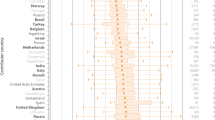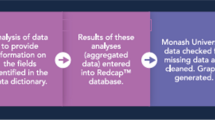Abstract
Background
Five International Federation for the Surgery of Obesity and Metabolic Disorders (IFSO) surveys since 1998 have estimated the volume and type of bariatric surgery being done in constituent member countries. These reports did not include baseline demographic descriptions.
Methods
An IFSO Global Registry pilot project in 2014 demonstrated that it was possible to amalgamate large numbers of individual patient data from different local and national database systems. Here we describe demographic data from the second report for 54,490 patients from 31 countries operated in the 3 calendar years 2013–2015 and follow up data from 66,560 of 112,544 patients in 2009–2015.
Results
Most procedures (97.8%) were performed laparoscopically and 73.3% (95% CI: 73.0–73.7%, range 54.2 to 80.3%) were female. The average age was 42.0 years (95% CI 41.9–42.1, inter-quartile range 33.0–51.0 years) and the median body mass index was 43.3 kg/m2 (inter-quartile range 39.4–48.8 kg/m2). Before surgery, 22.0% patients had type 2 diabetes (inter-country variation 7.4–63.2%); 31.9% were hypertensive (15.8–92.7%); 17.6% had depression (0.0–46.3%); 27.8% took medication for musculoskeletal pain (0.0–58.9%); 18.9% had sleep apnea (0.0–63.2%); and 29.6% of patients had gastro-esophageal reflux disease (9.1–90.9%). Gastric bypass was the most prevalent operation (49.4%), followed by sleeve gastrectomy (40.7%) and gastric banding (5.5%). The 1-year total weight loss for patients with available data was 30.53% (95% CI: 30.22–30.84%) and in the cohort 2009–15 was 30.4% with a follow-up rate of 59.14%. In the 2009–2015 cohort, 64.7% of patients on treatment for diabetes preoperatively were not on treatment postoperatively.
Conclusions
There is widespread variation in access to surgery and in baseline patient characteristics in the countries submitting data to the IFSO Global Registry.








Similar content being viewed by others
References
Arterburn DE, Courcoulas AP. Bariatric surgery for obesity and metabolic conditions in adults. BMJ. 2014;349:g3961.
Sjöström L, Narbro K, Sjöström CD, et al. Effects of bariatric surgery on mortality in Swedish obese subjects. N Engl J Med. 2007;357:741–52.
Buchwald H, Avidor Y, Braunwald E, et al. Bariatric surgery a systematic review and meta-analysis. JAMA. 2004;292:1724–37.
Mingrone G, Panunzi S, De Gaetano A, et al. Bariatric-metabolic surgery versus conventional medical treatment in obese patients with type 2 diabetes: 5 year follow-up of an open-label, single-centre, randomised controlled trial. Lancet. 2015;386:964–73.
Schauer PR, Bhatt DL, Kirwan JP, et al. Bariatric surgery versus intensive medical therapy for diabetes—3-year outcomes. N Engl J Med. 2014;370:2002–13.
Welbourn R, le Roux CW, Owen-Smith A, et al. Why the NHS should do more bariatric surgery; how much should we do? BMJ. 2016;353:i1472.
Ng M, Fleming T, Robinson M, et al. Global, regional, and national prevalence of overweight and obesity in children and adults during 1980–2013: a systematic analysis for the Global Burden of Disease Study 2013. Lancet. 2014;384:766–81.
Scopinaro N. The IFSO and obesity surgery throughout the world. Obes Surg. 1998;8:3–8.
Buchwald H, Williams SE. Bariatric surgery worldwide 2003. Obes Surg. 2004;14:1157–64.
Buchwald H, Oien DM. Metabolic/bariatric surgery worldwide 2008. Obes Surg. 2009;19(12):1605–11.
Buchwald H, Oien DM. Metabolic/bariatric surgery worldwide 2011. Obes Surg. 2013;23(4):427–36.
Angrisani L, Santonicola A, Iovino P, et al. Bariatric surgery worldwide 2013. Obes Surg. 2015;25:1822–32.
Welbourn R, Gagner M, Naslund I, Ottosson J, Kinsman R, Walton P. First IFSO Global Registry Report 2014. Dendrite Clinical Systems Ltd., Henley-on-Thames, RG9 1AY, UK. 2014. ISBN 978-0-9568154-9-1.
Welbourn R, Dixon J, Higa K, Kinsman R, Ottosson J, Ramos A et al. Second IFSO Global Registry Report 2014. Dendrite Clinical Systems Ltd., Henley-on-Thames, RG9 1AY, UK. 2014. 2016. ISBN 978-0-9929942-1-1.
World Health Organization. Global Health Observatory data repository. apps.who.int/gho/data/node.main.A900 A?lang=en. Accessed 14 Aug 2017.
International Diabetes Federation Atlas. Seventh Edition, 2015. http://www.dmthai.org/sites/default/files/idf_atlas_2015_uk_0.pdf. Accessed 14 Aug 2017.
Buchwald H, Estok R, Fahrbach K, et al. Weight and type 2 diabetes after bariatric surgery: systematic review and meta-analysis. Am J Med. 2009;122:248–256.e5.
Pournaras DJ, Aasheim ET, Søvik TT, et al. Effect of the definition of type II diabetes remission in the evaluation of bariatric surgery for metabolic disorders. Br J Surg. 2012;99:100–3.
Author information
Authors and Affiliations
Corresponding author
Ethics declarations
Funding Declaration
The IFSO Global Registry Second Report was funded by the International Federation for Surgery for Obesity and Metabolic Disorders.
Conflict of Interests
Dr. Welbourn declares support for attending conferences from Ethicon Endo-Surgery, consultancy fees from Novo Nordisk, funding of a Bariatric Clinical Fellow in Musgrove Park Hospital, Taunton TA1 5DA, UK from Ethicon Endo-Surgery, outside the submitted work. Dr. Dixon declares grants from NHMRC during the conduct of the study; personal fees from Apollo Endo-surgery, Bariatric Advantage, Covidien, iNova Pharmaceuticals, Novartis, Nestle, Novo Nordisk, mdBriefcase outside the submitted work. Dr. Higa declares personal fees from Ethicon, other from Endogastric Solutions outside the submitted work. Dr. Kinsman and Dr. Walton declare grants from IFSO during the conduct of the study, other grant from IFSO outside the submitted work. Dr. Pournaras Dr. Ottosson, Dr. Ramos, Dr. van Wagensveld, Dr. Weiner, and Dr. Zundel declare no conflict of interest.
Rights and permissions
About this article
Cite this article
Welbourn, R., Pournaras, D.J., Dixon, J. et al. Bariatric Surgery Worldwide: Baseline Demographic Description and One-Year Outcomes from the Second IFSO Global Registry Report 2013–2015. OBES SURG 28, 313–322 (2018). https://doi.org/10.1007/s11695-017-2845-9
Published:
Issue Date:
DOI: https://doi.org/10.1007/s11695-017-2845-9




